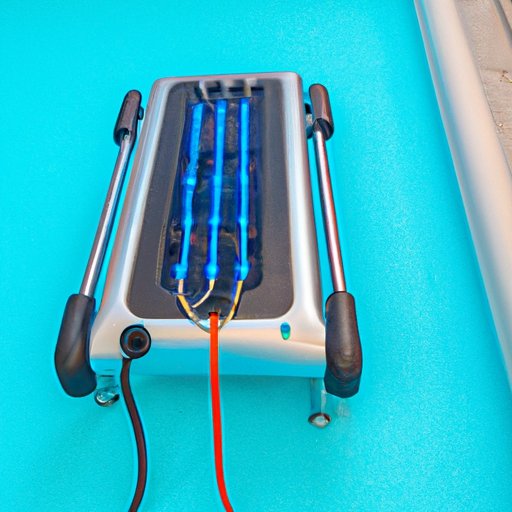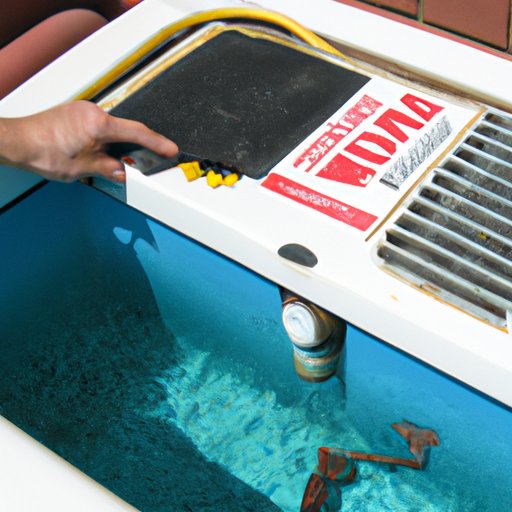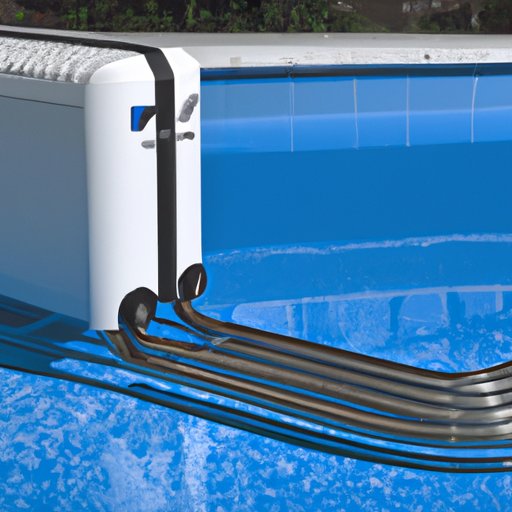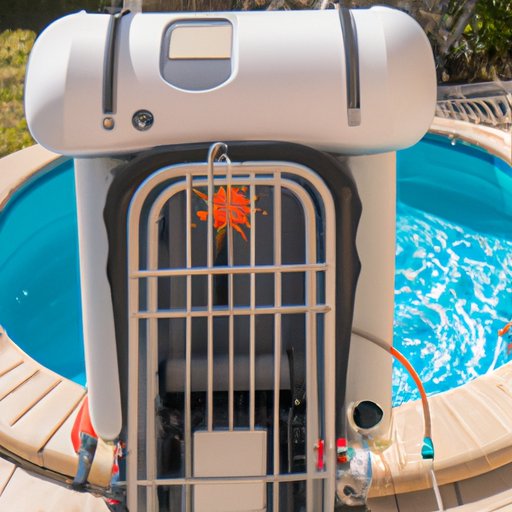
I. An Overview of How Pool Heaters Work
Swimming pools are a great way to enjoy summer days and cool off during hot weather. But in order to make your pool comfortable year-round, you need a reliable pool heater. But what is a pool heater and how does it work? In this article, we’ll look at an overview of how pool heaters work, the different types available, the installation process, and some tips for maintaining your pool heater.
A. Definition of a pool heater
A pool heater is a device that uses energy to raise the temperature of a swimming pool or spa. Pool heaters come in a variety of sizes and designs, but all are designed to do one thing: increase the temperature of the water in your pool.
B. Components of a pool heater
The components of a pool heater include a heat exchanger, a pump, and a thermostat. The heat exchanger is the part of the heater that actually heats the water. It works by transferring heat from the air or gas to the water. The pump circulates the water through the heat exchanger, and the thermostat controls the temperature of the water.
C. How a pool heater works
When the thermostat detects that the water temperature is below a certain level, it will turn on the pool heater. The pump then circulates the water through the heat exchanger, which transfers heat from the air or gas to the water. This raises the temperature of the water until the thermostat turns the heater off when the desired temperature is reached.
II. Exploring the Different Types of Pool Heaters
There are many different types of pool heaters available on the market today. The most common types are electric, gas, and solar pool heaters. Each type has its own advantages and disadvantages, so it’s important to consider all of your options before choosing the best type for your pool.
A. Electric pool heaters
Electric pool heaters use electricity to heat the water in your pool. They are relatively inexpensive and easy to install, but they can be expensive to operate. They also tend to be less efficient than other types of pool heaters.
B. Gas pool heaters
Gas pool heaters use either natural gas or propane to heat the water in your pool. They are typically more efficient than electric pool heaters and can heat the water quickly. However, they can be expensive to install and operate, and they require regular maintenance.
C. Solar pool heaters
Solar pool heaters use the sun’s energy to heat the water in your pool. They are the most environmentally friendly type of pool heater, and they require very little maintenance. However, they can be expensive to install and may not be able to heat the water as quickly as other types of pool heaters.
III. A Step-by-Step Guide to Installing a Pool Heater
Installing a pool heater can be a complicated process, so it’s important to follow the instructions carefully. Here is a step-by-step guide to installing a pool heater:
A. Preparing your pool
Before you begin the installation process, it’s important to prepare your pool. Make sure the water level is correct, the filter is clean, and the pH levels are balanced. You should also check the manufacturer’s instructions to ensure that your pool is properly prepared for the installation of a pool heater.
B. Selecting the right type of heater
Once your pool is ready, it’s time to choose the right type of heater for your needs. Consider your budget, the size of your pool, and the type of fuel you have access to when making your decision.
C. Installation process
Once you’ve selected the right type of heater, you can begin the installation process. Depending on the type of heater you’ve chosen, the installation process can vary. If you’re unsure of how to install your pool heater, it’s best to consult a professional.
IV. The Advantages and Disadvantages of Pool Heaters
Pool heaters can be a great addition to your pool, but there are both advantages and disadvantages that you should consider before purchasing one. Here are some of the pros and cons of pool heaters:
A. Advantages
Pool heaters can extend your swimming season and make your pool more comfortable year-round. They are also relatively low maintenance and can save you money in the long run. Additionally, pool heaters can help reduce the amount of chlorine needed to keep your pool clean.
B. Disadvantages
One of the main disadvantages of pool heaters is their cost. They can be expensive to purchase and install, and they can also be expensive to operate. Additionally, pool heaters require regular maintenance and can be difficult to install.

V. Tips for Maintaining Your Pool Heater
Maintaining your pool heater is essential in order to keep it running efficiently and safely. Here are some tips for maintaining your pool heater:
A. Clean and inspect regularly
It’s important to clean and inspect your pool heater regularly. Make sure to remove any debris or dirt from the exterior of the heater and check for any signs of damage or wear. Additionally, make sure to check the connections and wiring to ensure everything is secure.
B. Check water chemistry
It’s also important to check the water chemistry of your pool regularly. Make sure the pH levels are balanced and the chlorine levels are adequate. If the water chemistry is off, it can cause corrosion and damage to your pool heater.
C. Monitor air intake and exhaust
Lastly, it’s important to monitor the air intake and exhaust of your pool heater. Make sure the air intakes are clear and free of debris, and check the exhaust vents to make sure they are not blocked or clogged. This will help ensure your pool heater runs efficiently.
VI. Comparing Natural Gas, Propane, and Electric Pool Heaters
When selecting a pool heater, it’s important to compare the different types of pool heaters available. Here is a comparison of natural gas, propane, and electric pool heaters:
A. Pros and cons of natural gas
Natural gas pool heaters are efficient and can heat the water quickly. They are also relatively inexpensive to install and operate. However, they require a lot of maintenance and can be dangerous if not installed correctly.
B. Pros and cons of propane
Propane pool heaters are similar to natural gas pool heaters, but they require less maintenance. They are also relatively inexpensive to install and operate. However, they can be dangerous if not installed correctly.
C. Pros and cons of electric
Electric pool heaters are relatively inexpensive to install and operate, and they require very little maintenance. However, they tend to be less efficient than other types of pool heaters and can take longer to heat the water.

VII. Common Questions About Pool Heaters Answered
Choosing the right pool heater can be a difficult decision. Here are some answers to common questions about pool heaters:
A. What is the best type of pool heater?
The best type of pool heater depends on your needs and budget. Generally, gas pool heaters are the most efficient and solar pool heaters are the most environmentally friendly. Electric pool heaters are the least expensive to install and operate.
B. What size pool heater do I need?
The size of the pool heater you need depends on the size of your pool and the climate where you live. Generally, you should choose a pool heater that is large enough to heat the entire pool quickly.
C. How long will my pool heater last?
The lifespan of a pool heater depends on the type of heater and how well it is maintained. Generally, electric and solar pool heaters have the longest lifespans, while gas pool heaters have the shortest.
D. How much does a pool heater cost?
The cost of a pool heater varies depending on the type and size. Generally, electric pool heaters are the least expensive, while gas pool heaters are the most expensive. Solar pool heaters usually fall somewhere in between.
(Note: Is this article not meeting your expectations? Do you have knowledge or insights to share? Unlock new opportunities and expand your reach by joining our authors team. Click Registration to join us and share your expertise with our readers.)
